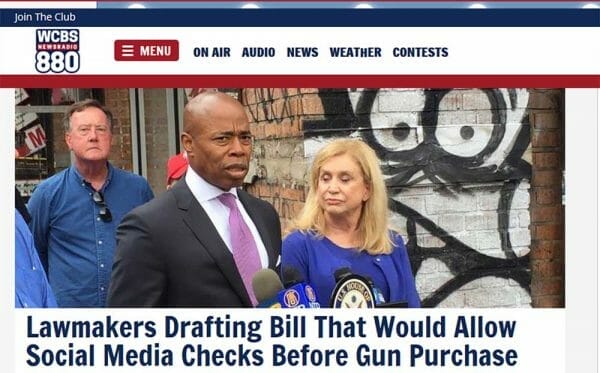Opinion

Fayetteville, AR –-(Ammoland.com)- New York lawmakers, Eric Adams, president of the Brooklyn Borough, and State Senator Kevin Palmer have illustrated my claim that when a person wishes to destroy one right, all rights become mere tools or obstacles in pursuit of that goal.
They propose to require a trolling through of the last three years of a prospective gun buyer’s social media accounts before a gun sale will be allowed.
Specifically, they want to deny sales to anyone who has engaged in hate speech on such platforms.
The example used by Adams as someone who would be prevented from completing a legal purchase is the man who killed eleven and wounded six at the Tree of Life Synagogue in Pittsburgh. The murderer in question indeed spewed hate, declaring, for example, that “Jews are children of Satan.” He also posted his intention to harm, stating on his Gab account that “HIAS [Hebrew Immigrant Aid Society] likes to bring invaders in that kill our people. I can’t sit by and watch my people get slaughtered. Screw your optics, I’m going in.”
At what point along the continuum on which those two comments lie would Adams and Palmer decide that a person should be barred from gun ownership isn’t clear, but to anyone who understands the general concept of rights, the subject is easy. Calling Jews the offspring of the chief prosecutor of the children of God (see the Book of Job for the historical reference) was aimed at being offensive. But as difficult as this is for some people, our commitment to freedom of speech is tested by how much we’re willing to respect the rights of others to say things that we disapprove of, however vehemently! By contrast, when someone tells the world that he is “going in,” after describing a group of people as invaders seeking to kill, that should be reported to law enforcement, and the latter should ask him some pointed questions at the very least.
What Adams and Palmer seem unaware of is the fact that making threats of violence is already a crime.
In Pennsylvania, it is a first-degree misdemeanor, carrying a maximum sentence of five years in prison, which would make someone convicted of that crime a prohibited person. Or perhaps they do know these things, and rather than use the laws that we already have, ones that would remove violent people from the streets without burdening people who have committed no crimes, they want to chip away at the First Amendment in their desire to restrict who may exercise the rights protected by the Second.
As I suggested above, you may evaluate my stance on rights by my willingness to leave my neighbors free to do things that don’t affect me. If they wish to have a combination of same-sex orgy and pot-brownie eating contest, as long as they keep the volume down, it’s none of my business. I won’t even be offended. If they want to discuss their admiration of the Nazis, I will be disgusted, but as long as they keep things in the realm of the verbal, again, my business is somewhere else. For the busybodies among us, this is a painful reality, but a free society isn’t particularly accommodating to meddling.
If more politicians would understand that “I don’t like” is not the same as “ought to be banned” and would spend more time addressing the genuine threats to the rights and safety of us all, we’d waste a lot less time having to fight bad policy such as what Adams and Palmer have proposed.
About Greg Camp
Greg Camp has taught English composition and literature since 1998 and is the author of six books, including a western, The Willing Spirit, and Each One, Teach One, with Ranjit Singh on gun politics in America. His books can be found on Amazon. He tweets @gregcampnc.
